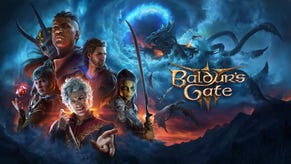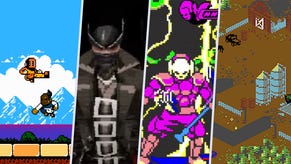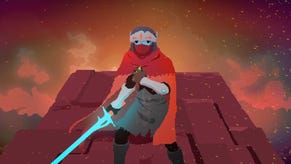Ten tips for pitching from the head of ID@Xbox
Chris Charla gives developers a crash course on the dos and don'ts of selling potential partners on game ideas
As the head of Microsoft's ID@Xbox program since its inception in 2013, Chris Charla has heard a lot of pitches. In his opening address at last week's GamesIndustry.biz Investment Summit event at PAX East, Charla offered developers some insight into what Microsoft is looking for when it hears pitches, and offered 10 pieces of advice that should work regardless of who a developer is pitching.
1. Take a shower, brush your teeth, dress for confidence
This is something Charla mentioned on Twitter recently, as developers often ask him where the bar is set for personal grooming and appearance when pitching games. While there definitely is one, Charla said it's relatively easy to clear.
"There's never been a case where we signed a game because a person was well-dressed at the pitch. And there's also never been a case where we didn't sign a game because the person was dressed as a slob."
That doesn't mean developers should wear sweatpants to pitch their game, as Charla advised prioritizing clothing that helps them feel confident over clothing that helps them feel comfortable.
2. Have a well-developed elevator pitch
"You should be able to explain the top concept of your game in 30 seconds. Last night I was trying to think of counter-examples where you couldn't explain the concept of a great game in 30 seconds, and I can't think of one."
3. Don't pitch the kitchen sink - have a focused concept
Charla credited this point to Ada Duan, the GM of business development at Xbox. When the Xbox team hears pitches, they're more interested in the key innovation a developer has centered a game around than a pastiche of various things the pitcher thinks they want to hear.
"If you're making a cool innovation in a first-person shooter, focus on that innovation. Don't feel obligated to add crafting and a battle royale mode, or level creation. If those things fit with the concept and help, feel free to add them. But don't just try to pitch us a buzzword soup."
4. Don't be wishy-washy in the pitch
If somebody asks about an element your game doesn't have, don't feel obligated to say it does have that then twist the pitch into what you think they might be looking for on the fly.
"We understand that things change in development. And when you are focused on one or two key gameplay innovations, there may be a lot of stuff that just isn't developed yet. That's totally OK."
5. Don't lead with the backstory, ever! Lead with the elevator pitch.
"It's not that we don't want to hear the backstory or what happened 10,000 years ago when Kraytor was first unearthed and all that kind of stuff. That stuff is really important. I'm not trying to dismiss it. I'm just saying most of the people you're going to talk to in a lot of pitch situations are hearing 20 pitches a day... You will start to lose them [with backstory], and they're going to be like, 'Get to the meat of the gameplay.'"
It's good for developers to have ideas about what they want to do for lore or back story, but Charla said those are best saved for later discussions.
6. Listen while you pitch; read the room, don't be on a talk train
In his previous career as a developer, Charla was one of three or four people that would handle his studio's pitching. And sometimes he could see mid-pitch that he wasn't "clicking" with the people in the room. When the other people pitching seemed to be making a better connection with the audience, he would back off and let those developers take over the pitch.
"It comes with practice, but learn to read the room and understand how to talk so that people can understand you."
7. It's OK not to have all the answers
This part was so tied in to the fourth point above that Charla actually covered it out of order in his talk, building on the same example of a developer being asked about a system or mechanic that isn't in the game and then committing to it and making up a detailed explanation of it during the pitch itself. While Charla acknowledged particularly skilled pitchers and designers may be able to do this on the fly, it's obvious to everyone in the room what's happening and it would be better for the developer to simply say, "We'll get back to you."
"The reality is it's OK not to have all the answers. Don't feel forced to make something up."
8. Demo > Video > Concept Art > Words
This one is pretty self explanatory.
"Demos are awesome. They can be grayboxed or whiteboxed. We're used to looking at stuff really, really early in development... If you show up with a playable demo, that's going to be the best possible thing."
Failing that, video is preferred to concept art, which is preferred to a simple description of the game. For developers who haven't established a track record of being able to follow through on what they promise, it can be particularly difficult to convince an audience that they can achieve their goals if all they have to show are words.
9. Pitch early, pitch often, practice your pitch a lot
"Pitch to everybody. Pitch to your roommates, your dog, your cat, your mom. The reason you do that is not so that when you come into a pitch you're well-practiced and say the exact same words every time. It's so that you know your game inside and out. You know the pitch, you know the concepts inside and out. And when you come in, you're super passionate about your concept. You can just have a conversation about it. You can feel really natural and relaxed."
10. Find and cultivate your internal champion
"You want to find one person inside Microsoft, or Nintendo, or [Sony], or Apple, or Epic, or Google who loves your game. That doesn't mean they're necessarily going to be able to get the game greenlit all by themselves, but it means you know that inside that company, that person is always bringing up your game in meetings, always talking about your game."
Charla endorsed a recent GDC talk on the subject by former Sony and Oculus indie liaison Nick Suttner for more on the importance of finding a champion. However, Charla cautioned this isn't a magic bullet, noting that even he champions games that don't get deals.
"There is no guarantee that we're going to sign the game. It takes a lot more than one person being super into the game. But it's rare that a game gets signed if it doesn't have someone internally championing it."
While it wasn't part of his ten tips, Charla also told developers that persistent follow-up with the people they pitch to is a good practice, although he noted it's also a good idea to respect contacts' nights and weekends and limit such follow-ups to business hours.
"We all want to hear yes when we're pitching something, but if you're not going to hear yes, you want to hear a quick no," Charla said. "And persistent follow-up can get you that answer, whether it's going to be yes, we need more information, or no."








